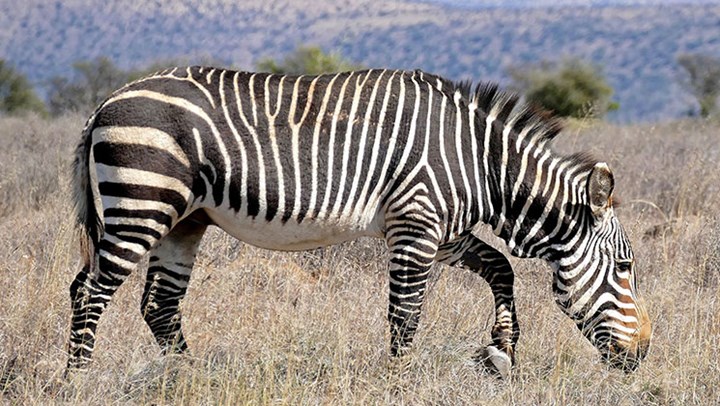
by Catherine Semcer - Tuesday, April 24, 2018

U.S. Secretary of the Interior Ryan Zinke announced on Friday that the Cape mountain zebra, a sub-species endemic to South Africa, has recovered from the brink of extinction and that import restrictions under the U.S. Endangered Species Act (ESA) are likely no longer warranted. The resulting U.S. Fish and Wildlife Service (USFWS) decision published in the Federal Register on Apr. 17 highlights a 90-day finding to remove the zebra from the U.S. list of threatened and endangered species under the ESA. If removed, U.S. hunters could play a more active role in the zebra’s conservation and, in turn, create economic incentives for South African landowners to develop additional zebra populations on their farms and ranches.
The decision is in response to a petition submitted by the U.S.-based Conservation Force, a hunter led organization with a mission of conserving wildlife and wild places. The petition indicated that many threats once facing the Cape mountain zebra were no longer present and that the species’ population had increased from approximately 80 animals in the 1950s to roughly 4,800 in 2016. Much of this growth occurred between 1985 and 2015, when the species saw a 572 percent increase within conservation areas. The multilateral Convention on International Trade in Endangered Species (CITES), which is implemented in the United States via the ESA, had previously removed restrictions on trade in Cape mountain zebra, including hunting trophies, in 2016.
One reason for the species’ dramatic population increase has been the efforts of hunters within South Africa to improve its habitat. In one recent example, the hunter’s association Kaapjag donated a solar pump and a 5,000-litre water tank to the Kammanassie Nature Reserve to help mitigate the effects of drought and wildfires on the area herd. Kaapjag conservation official Gustav Smit was quoted in the press as saying “We decided to get involved because we are not only hunters but care for the environment as well and conservation has played a role in Kaapjag’s activities since our establishment 34 years ago.”
For some background, once the Cape mountain zebra was listed under the ESA, the USFWS stopped issuing trophy import permits for the species. This disincentivized conservation of the species in South Africa and held back the potential of conservation efforts there by causing the species to be undervalued. As has happened with the Southern white rhino, bontebuck and other species, allowing U.S. hunters to import Cape mountain zebra trophies is likely to create economic incentives for South African landowners to raise and provide habitat for the species, as they can then derive income from hosting zebra hunts. By expanding the species’ range in this way, the ongoing threat of inbreeding to the species also can be more effectively addressed.
“The hunting and trophy imports provide necessary revenue to offset the costs of reestablishing and maintaining animals on more and more private lands while incentivizing landholder stewardship,” says Conservation Force Founder and President John Jackson. “In short, the revenue and incentives from game hunting have converted landholders into the trustworthy shepherds of the Cape mountain zebra.”
Rather than wait the year or more for the USFWS to finalize any delisting decision, Conservation Force is working to create economic incentives for zebra conservation now by filing a series of pioneer import permits on behalf of several U.S. hunters. The permit applications rest on the “enhancement” provisions of the ESA, which allow for individuals of a listed species to be hunted if doing so enhances the conservation of the species as whole. If successful, these permits will open the doors for conservationists to stay one step ahead of the bureaucracy.
The decision to pursue delisting the Cape mountain zebra is further evidence of a more positive attitude at the Department of the Interior (DOI) toward hunters and hunting, and other sustainable uses of wildlife. On the international front, the new era was previously marked by Secretary Zinke’s decision to create an International Wildlife Conservation Council (IWCC) to advise the DOI on the role of hunters and hunting in delivering conservation worldwide. This trend brings the United States closer to its conservation partners in Africa and elsewhere where hunting is recognized as a critical revenue generator for wildlife conservation and component of wider sustainable development goals. It also represents a re-embracement of the truth spoken by Theodore Roosevelt that “the genuine sportsman is by all odds the most important factor in keeping the larger and more valuable wild creatures from total extermination.”
■ ■ ■
Editor’s Note: As noted repeatedly by NRA-ILA Executive Director Chris Cox, Secretary Zinke recognizes that hunters and anglers are the backbone of successful fish and wildlife management. This is why he has prioritized hunting and fishing access from day one. For a recap of Secretary Zinke’s accomplishments on behalf of sportsmen after just once year in office, click here.
E-mail your comments/questions about this site to:
[email protected]
Proudly supported by The NRA Foundation and Friends of NRA fundraising.
